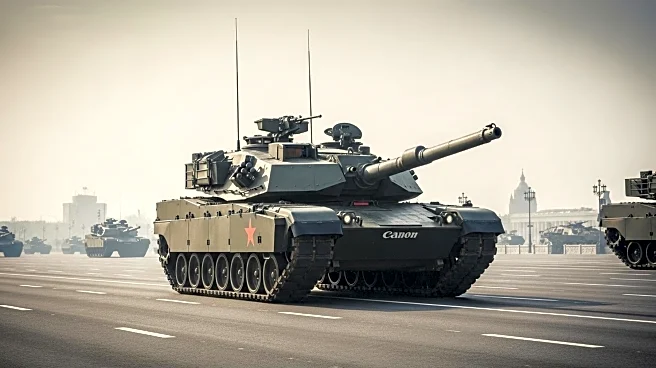What's Happening?
North Korean leader Kim Jong Un has embarked on a journey to China aboard his armoured train to attend a military parade in Beijing. The 'Victory Day' parade will feature Kim alongside Chinese President Xi Jinping, Russian President Vladimir Putin, and other world leaders. This marks Kim's first multilateral international meeting, highlighting North Korea's diplomatic engagement with China. The train, known for its luxurious amenities, is expected to take up to 24 hours to reach Beijing. Kim's attendance at the parade is significant, as it is the first time a North Korean leader has participated in a Chinese military parade since 1959.
Why It's Important?
Kim Jong Un's visit to China underscores the strengthening ties between North Korea and China, which could have implications for regional security and diplomatic relations. The presence of leaders from various countries at the parade indicates China's efforts to bolster its influence in Southeast Asia and beyond. This development may affect U.S. foreign policy, as North Korea's engagement with China could alter the dynamics of negotiations concerning North Korea's nuclear program. The parade serves as a platform for China to showcase its military prowess and diplomatic reach, potentially challenging U.S. interests in the region.
What's Next?
Following the parade, Kim Jong Un is expected to engage in discussions with Chinese and Russian leaders, which may focus on economic cooperation and security issues. The international community will be watching closely for any announcements or agreements that could impact regional stability. The U.S. and its allies may need to reassess their strategies in dealing with North Korea and China's growing influence. Future diplomatic engagements between North Korea and China could shape the geopolitical landscape in East Asia.
Beyond the Headlines
Kim Jong Un's travel by train reflects a longstanding tradition in North Korea, symbolizing continuity and historical ties. The luxurious nature of the train highlights the contrast between North Korea's leadership and the country's economic challenges. The parade and Kim's participation may also have cultural implications, as they represent North Korea's attempt to assert its presence on the international stage. The event could influence perceptions of North Korea's leadership and its role in global affairs.









